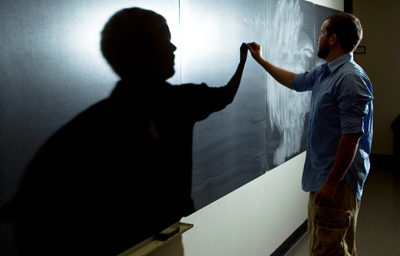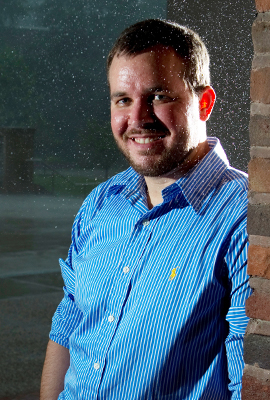Justin Taylor
Ph.D. Student
By Megan Neff
Photos by Mark Cornelison
Like a lot of us out there, Justin Taylor didn’t have it easy when it came to math. But unlike the rest of the crowd, who grumbled through the required courses until the hallowed day of escape, he decided to make the struggle into a more challenging equation: a career.
However, the path to this decision did not follow any predetermined formula. After graduating from high school in the southeastern Missouri town of Sikeston, Taylor opted out of the two to four-year college route. Instead, he joined the Marine Corps and was stationed at Camp Pendleton near San Diego between 1998 and 2002. Here, he not only underwent a rigorous test of his physical endurance, but his mental strength, as well.
“A lot of my beliefs, my work ethic, and my dedication to try and be the best at everything stems from the experiences in the corps,” said Taylor. “When I got out of the corps and went to college for the first time, I knew I wanted to study something challenging. I took a few classes and decided that math would probably be the hardest to study and excel.”

Time spent in the Marine Corps had conditioned Taylor to accept challenges, and as an undergraduate at Southeast Missouri State University in 2002, he would accept the challenge that math presented and tackle it.
After four years of not-so-basic training and one bachelor’s degree in math in hand, he came to the University of Kentucky for graduate school. He was drawn to the college because of the number of mathematicians studying his chosen field, partial differential equations, as well as the opportunity to teach a wide range of classes as a graduate student.
In the spring of 2010, Taylor’s hard work at UK found prestigious recompense in the form of the Provost’s Outstanding Teaching Award as a teaching assistant in the Department of Mathematics.
“Winning this award really felt great,” said Taylor. “I think there are a number of people who maybe should have gotten it over me, but I think the real reason that I won this award is because I can relate to my students' struggles in math.”
Currently, Taylor is working on a paper with his advisor, Russell Brown. The research ranges from the convergence of eigenvalues for an elliptic operator to an examination of regularity results for the Green function that can be applied to solutions of the mixed problem.
“Doing research has taught me to be patient when trying to solve a problem,” said Taylor. “Also, I've learned that although much research in mathematics has been done, there will always be another problem to solve.”

Taylor does not see the future laid out in any knowable pattern, but whatever the unpredictable course may be, he intends to pursue a teaching career at a small college after finishing graduate school.
“Although I feel that I will continue to do small projects from time to time, my passion is in teaching because of the effects of it on the students and my love to work around different people every so often,” said Taylor. “At whatever university I end up, I hope to implement courses that cover more applications in mathematics.”
While he might have been at a disadvantage to begin with, Taylor can now use this to his advantage. As a teacher, he feels that he can use his unique perspective to encourage students who might otherwise succumb to the attractive grumbling-until-escape path.

Taylor weathering the storm, literally and mathematically
“I am not the typical grad student in math; I've always had to work more than most,” said Taylor. “My first math class in college was college algebra, not calculus 3 like most grad students here. So, I think that me having to start from the bottom makes it easier for me to teach them and get them motivated.”
And so Taylor’s methodology seems simple enough for the mathematically challenged among us to parse out: don’t give up when the going gets tough. The results might just turn out to be extraordinary.
